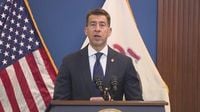On October 22, 2025, Illinois Secretary of State Alexi Giannoulias issued a stern warning to federal immigration agents operating in the state: tampering with or swapping license plates during enforcement operations is illegal and won’t be tolerated. The message, delivered both in a press release and in public statements, comes amid rising tensions around federal immigration enforcement in the Chicago area and mounting public concern about the tactics employed by U.S. Immigration and Customs Enforcement (ICE) agents.
The controversy erupted after reports surfaced that ICE agents had been changing or flipping state-issued license plates on their vehicles while carrying out what Giannoulias described as “military-style deportation efforts” in and around Chicago. The issue gained wider attention when a video circulated on social media showing an ICE agent responding to a bystander filming their vehicle’s license plate. In the video, the agent says, “You can record all you want. We change the plates out every day.” According to WTVO and the Illinois Secretary of State’s Office, this admission confirmed suspicions that agents were deliberately attempting to avoid detection or identification by swapping plates.
Giannoulias was unequivocal in his response. “Swapping out license plates or tampering with them to avoid or conceal detection is illegal, unsafe and will not be tolerated in Illinois,” he said, as reported by WTVO and confirmed by his office. “No one, including federal agents, is above the law, and we intend to hold them accountable, especially while driving on our roadways. This is a matter of public safety and protecting the wellbeing of our communities.”
The Secretary of State’s office quickly moved to address the situation, announcing the creation of a “Plate Watch Hotline” for residents to report suspected license plate tampering. The hotline can be reached by calling 312-814-1730 or by emailing [email protected]. “We want the public to know that there’s a direct line for reporting this kind of activity,” Giannoulias emphasized. “It’s about keeping our roads safe and ensuring everyone, regardless of their job or position, follows the law.”
Under Illinois law, the display of a license plate not authorized for a specific vehicle, or the obscuring or modification of a plate in any way, is strictly prohibited. The penalties are no slap on the wrist: violators can face fines, possible jail time, and even suspension or revocation of the vehicle’s registration. Giannoulias reminded all drivers that Illinois-registered vehicles must display two license plates—one on the front and one on the back. Vehicles from other states must comply with their own state’s requirements while driving in Illinois.
The timing of the Secretary of State’s warning is no coincidence. It comes as federal immigration enforcement efforts have ramped up in Chicago and its suburbs under President Donald Trump’s administration. According to the Illinois Secretary of State’s Office, Broadview’s ICE facility has become a flashpoint for protests, some of which have escalated over the past month. Demonstrators have voiced concerns about aggressive federal tactics, the secrecy surrounding enforcement operations, and the impact on local communities.
The situation has also spilled over into the courts. As reported by the Secretary of State’s Office, a judge recently blocked the Trump administration from deploying the National Guard to assist federal agents in immigration crackdowns across the Chicago area. In a separate ruling, another judge ordered federal immigration agents to wear body cameras during operations, a response to protests over what some have described as aggressive crowd control tactics by ICE personnel. These judicial interventions highlight the high level of scrutiny and controversy surrounding federal immigration enforcement in Illinois.
For many Illinois residents, the revelation that federal agents may be circumventing state law by swapping license plates has raised questions about accountability and transparency. “It’s not just about following the letter of the law,” said a resident who asked not to be named for fear of retaliation. “It’s about trust. If federal agents can break the rules, what does that say to the rest of us?”
Giannoulias’s office has been clear: the law applies to everyone. “No one, including federal agents, is above the law,” he reiterated, echoing his earlier statement. “We intend to hold them accountable, especially while driving on our roadways.” His insistence on equal accountability reflects a broader sentiment in Illinois government, where state officials have frequently clashed with federal authorities over immigration policy and enforcement methods.
Local law enforcement agencies have also been drawn into the debate. While some officers support robust immigration enforcement, others worry that aggressive federal tactics—and the perception that agents are acting with impunity—could damage relationships between law enforcement and the communities they serve. “Public safety depends on trust,” said one local police chief, speaking on background. “If people think the rules don’t apply to everyone, it makes our job harder.”
The Plate Watch Hotline is part of a broader effort by the Secretary of State’s office to involve the public in upholding state law. “We’re asking residents to be vigilant,” Giannoulias said. “If you see something suspicious—like a vehicle with plates that don’t match or appear altered—let us know.” The office has promised to investigate all credible reports, and Giannoulias has indicated that any confirmed violations will be pursued to the full extent of the law.
For now, the spotlight remains on ICE and its operations in Illinois. The agency has defended its enforcement tactics in court, but the public outcry over license plate tampering has put federal agents under increased scrutiny. As debates over immigration policy continue to roil the nation, Illinois officials are making it clear that, at least when it comes to the state’s roads and public safety, there will be no special treatment for anyone—federal badge or not.
In a state where the rule of law is a point of pride, Giannoulias’s warning sends a simple but powerful message: everyone, from the governor to the newest resident to the federal agent on patrol, is expected to play by the same rules. And, if the public has anything to say about it, those rules aren’t changing anytime soon.




